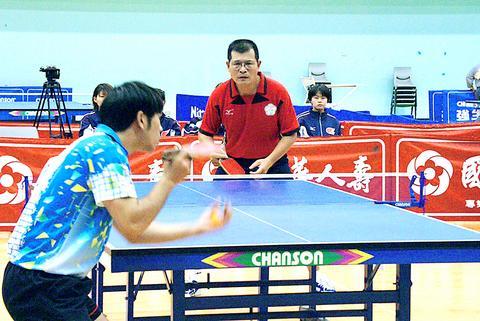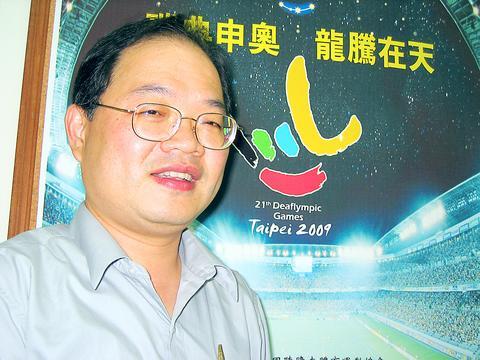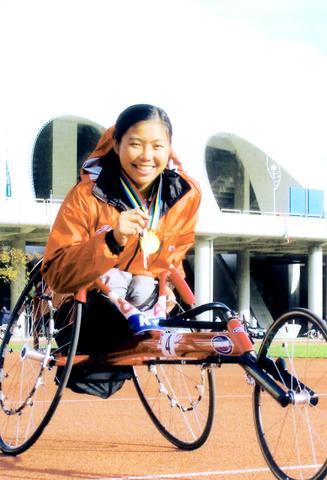While the nation's poor showing on the international sporting scene continues to flummox sports-minded folk, athletics committees could do a lot worse than look at and learn from Taiwan's special needs sports associations that constantly manage to build medal winning teams.
Whether it's a regional table tennis competition, or an international athletics meet, Chinese Taipei's paraplegic, deaf and mentally handicapped athletes rarely come home empty handed.

PHOTO COURTESY OF THE CHINESE TAIPEI SPORTS ASSOCIATION OF THE D
Since 1992 -- the year the International Olympic Committee (IOC) recognized Taiwan's handicapped sports associations -- the Chinese Taipei Sports Association of the Deaf (

PHOTO: GAVIN PHIPPS, TAIPEI TIMES
The most recent of these successes took place at the Special Olympics World Games, which were held in Dublin, Ireland, in August. A 43-member squad brought home 10 gold, 13 silver and 11 bronze medals. The team's strongest fields proved to be bocce, aquatics and bowling.
"We started a special five-stage training program a year before we left for Dublin and it certainly paid off," said James Chang (

PHOTO COURTESY OF CHINESE TAIPEI PARALYMPICS COMMITTEE
However impressive these achievements, maybe they are being overlooked. Not that this has stopped the nation's handicapped sports men and women from building up a reputation as some of the finest physically and mentally impaired athletes in the world. This is a status that, according to Lai Fau-hwan (
"The biggest problem has always been the fact that non-handicapped [Taiwanese] put far too much emphasis on being a hero and winning rather then simply participating," Lai said. "I look at it differently. It's not about winning, it's about physical well-being, enjoyment and involvement."
A graduate of Taiwan Normal University's faculty of Physical Education, Lai lost his left leg in motorcycle accident in 1979. His prosthetic limb didn't stop him becoming one of the nation's first paraplegic gold medal winners.
Lai entered the record books at the 1989 Far East and South Pacific Games for the Disabled (FESPIC) in Kobe, Japan, winning gold in the discus and javelin and silver in the shot putt. On his return to Taiwan, Lai was greeted to a hero's welcome and even honored at a special reception by then president Lee Teng-hui (李登輝).
On taking over as director of the Chinese Taipei Paralympics Committee in 1992, Lai's first task was to secure funding for the cash-strapped organization.
Although government funding was not forthcoming for the first three years of Lai's tenure, in 1995, the government finally caved in and donated NT$10million to the committee for training and education programs and travel expenses.
"It was a real fight to get the funding in the beginning. I don't think the government considered [handicapped] sports worthy of funding," said the committee director. "It's gotten a lot better. Society's opinions about us and what we can achieve, given the right support, has changed for the better."
According to Lai, since President Chen Shui-bian (陳水扁) began his term in office, acquisition of annual funds for the paralympics team has got easier. Instead of an annual budget, funding is based upon the committee's sporting calendar.
Due to its participation in the upcoming Wheelchair Games in Christchurch, New Zealand, in October, this year's budget weighed in at just over NT$20million. With the cash, Lai said he was confident Taiwan's paralympic team would continue to prove its medal winning mettle in track and field events, table tennis and power lifting.
"There might be no fixed annual budget, but the funding we do get is enough and enables us to attend more competitions, which in turn means we are in a constant state of improvement," Lai said.
Receiving slightly less funding -- roughly NT$5million per annum -- the Chinese Taipei Sports Association of the Deaf has also made its mark on the international sporting scene; athletics, aquatics and table-tennis being the three areas in which the associations excels. Deaf athletes are not permitted by IOC rules to participate in sports that involve physical contact such as judo and wrestling for safety reasons.
Deaflympic success might have eluded the team, but after participating in only three Asian Pacific Games for the Deaf since 1996 the Chinese Taipei Sports Association of the Deaf is currently lying second in the overall Asian standings. Its behemoth cross-strait rival China is third with 22 gold medals to Taiwan's 24.
"When you look at the numbers of those eligible to participate in deaf games in China for example, then Taiwan's achievement is fantastic," said Chao Yu-ping (
Along with beating China into second place in the Asian rankings, Taiwan's deaf athletes have also enjoyed the prestige of hosting the Deaflympics. In 2000 the sixth Asian Pacific Games for the Deaf was held in Taipei. The event saw Taiwan placing second to Japan by a margin of only three silver medals.
The association was recently given another boost after Taiwan won the rights to host the 2009 Deaflympics, which will be the first time the event has ever been held in an Asian country since its inception in 1924.
Although Taiwan's handicapped athletes are all amateurs, those athletes chosen to represent their country still take international competition very seriously. Along with its regular coaching sessions, the Chinese Taipei Paralympics Committee has recently taken to using sports psychologists in order to enhance performance. Also, members of the paralympic squad have been visiting the Chinese Culture University's Graduate Institute of Sport Coaching Science (
Wired up to an array of specially adapted exercise machines, faculty members such as Professor Jasson Chiang (
"We have specially adapted machines on which we can plot the handicapped athletes' physiology. With the coaches present we map out a training schedule that best suits each particular individual," said Chiang. "Unlike non-handicapped athletes, each one has his/her restrictions and own needs. We haven't been doing it long and we're still learning, but it's certainly made a difference, especially to the younger athletes."
Regardless of their physical disparities and amateur status, Taiwan's paraplegic, deaf and mentally handicapped teams haven't avoided the irksome shenanigans of Beijing that take place at international sports meets. Old rivalries still run deep, as Taiwan's paralympic team discovered nine years ago.
The slap in the face took place at the 1994 FESPIC Games in Beijing after a stadium announcer at the awards ceremony referred to Taiwan as "China Taipei" as opposed to the officially IOC recognized moniker of Chinese Taipei.
"I told them in no uncertain terms that if they didn't correct the mistake and announce [our] name in accordance with IOC rules that we would boycott the awards ceremony," said the paralympic committee director with a smirk. "Whether it was deliberate or not I don't know. They said it again properly, though and we took to the podium with the other teams."

Towering high above Taiwan’s capital city at 508 meters, Taipei 101 dominates the skyline. The earthquake-proof skyscraper of steel and glass has captured the imagination of professional rock climber Alex Honnold for more than a decade. Tomorrow morning, he will climb it in his signature free solo style — without ropes or protective equipment. And Netflix will broadcast it — live. The event’s announcement has drawn both excitement and trepidation, as well as some concerns over the ethical implications of attempting such a high-risk endeavor on live broadcast. Many have questioned Honnold’s desire to continues his free-solo climbs now that he’s a

As Taiwan’s second most populous city, Taichung looms large in the electoral map. Taiwanese political commentators describe it — along with neighboring Changhua County — as Taiwan’s “swing states” (搖擺州), which is a curious direct borrowing from American election terminology. In the early post-Martial Law era, Taichung was referred to as a “desert of democracy” because while the Democratic Progressive Party (DPP) was winning elections in the north and south, Taichung remained staunchly loyal to the Chinese Nationalist Party (KMT). That changed over time, but in both Changhua and Taichung, the DPP still suffers from a “one-term curse,” with the

Jan. 26 to Feb. 1 Nearly 90 years after it was last recorded, the Basay language was taught in a classroom for the first time in September last year. Over the following three months, students learned its sounds along with the customs and folktales of the Ketagalan people, who once spoke it across northern Taiwan. Although each Ketagalan settlement had its own language, Basay functioned as a common trade language. By the late 19th century, it had largely fallen out of daily use as speakers shifted to Hoklo (commonly known as Taiwanese), surviving only in fragments remembered by the elderly. In

William Liu (劉家君) moved to Kaohsiung from Nantou to live with his boyfriend Reg Hong (洪嘉佑). “In Nantou, people do not support gay rights at all and never even talk about it. Living here made me optimistic and made me realize how much I can express myself,” Liu tells the Taipei Times. Hong and his friend Cony Hsieh (謝昀希) are both active in several LGBT groups and organizations in Kaohsiung. They were among the people behind the city’s 16th Pride event in November last year, which gathered over 35,000 people. Along with others, they clearly see Kaohsiung as the nexus of LGBT rights.